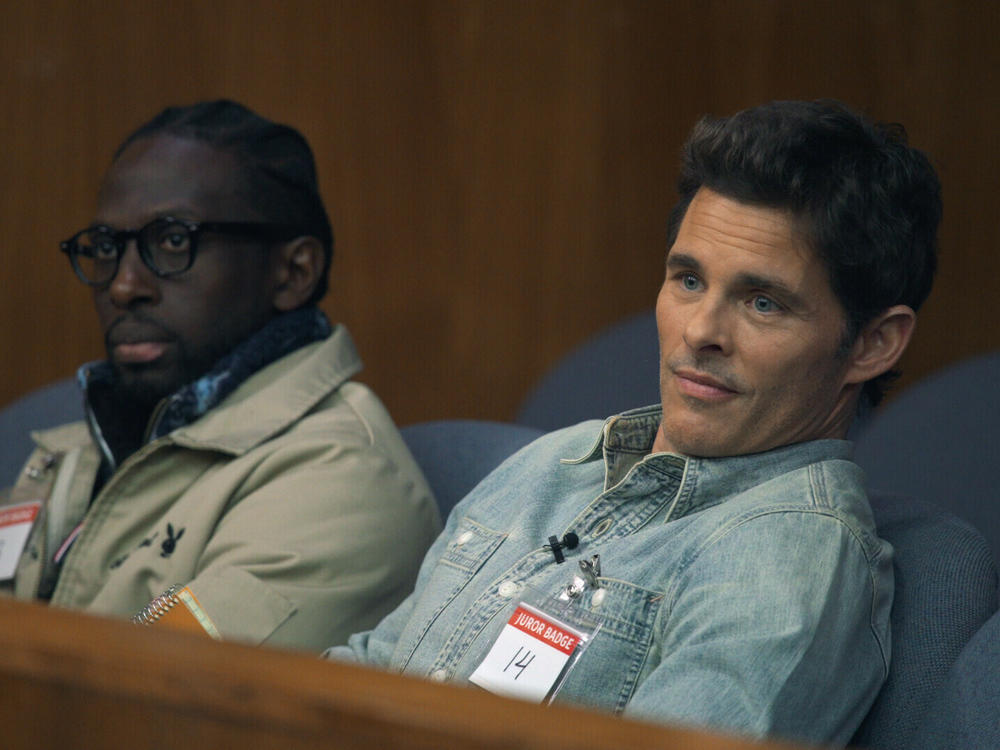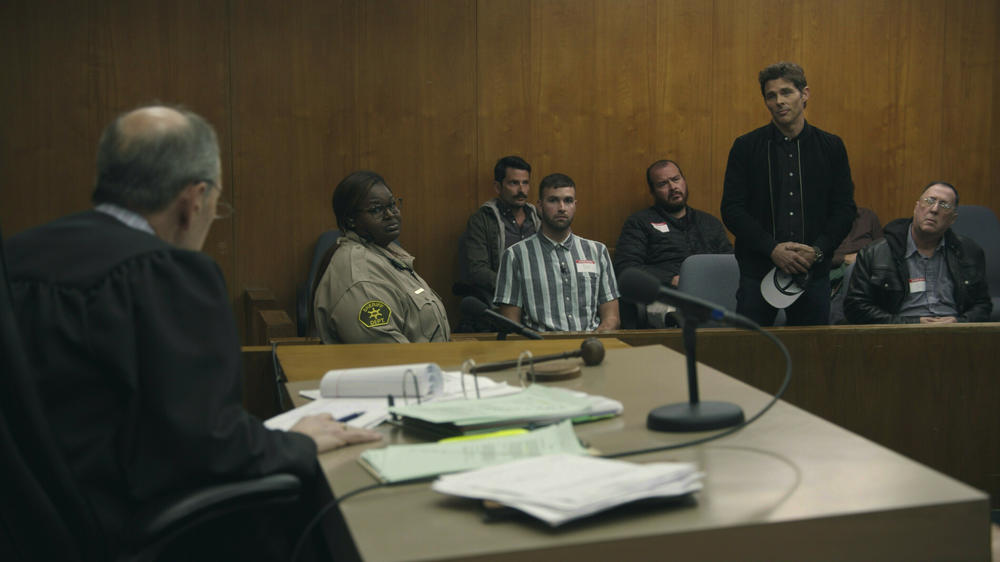Section Branding
Header Content
This fake 'Jury Duty' really put James Marsden's improv chops on trial
Primary Content
The new show Jury Duty has its genetic roots in the old TV show Candid Camera, where surprising things happened to unwitting bystanders — and hidden cameras captured their reactions.
In the Amazon Freevee series Jury Duty, a solar contractor named Ronald Gladden has agreed to participate in what he believes is a documentary about the experience of being a juror. Cameras track Ronald as he goes to the LA courtroom, is picked as the jury foreperson and follows along with the court proceedings. But what Ronald doesn't know is that the whole thing is fake — the entire courthouse has been fitted with hidden cameras and everyone there except him is an actor. Actor James Marsden, who plays a satirical, egotistical version of himself, calls the show a "very ambitious conceit."
"I had many reservations, and the biggest one was the wild card of this one human being who's being dropped into this situation that is all fake and manufactured," Marsden says. "Is this even something that is ethically right to do, to play with someone's human experience over the course of three weeks of their life?"
From the beginning, Marsden told show creators Lee Eisenberg and Gene Stupnitsky (who also worked on The Office) that he didn't want to participate in a prank show. But they assured him that Jury Duty wouldn't be cruel or mean-spirited. Instead, Marsden says, the intention was to create a "hero's journey" for Gladden.
Marsden says that they told him: "We're surrounding him with is this cast of bizarre, eccentric weirdos and hopefully carving out a path for him to become the leader at the end, and have his 12 Angry Men moment, where he inspires us all and unites us and then we pull the curtain back and celebrate him as a human being."
Marsden, whose film and TV credits include four X-Men movies, The Notebook, Enchanted, Westworld and Dead to Me, says Jury Duty was like no other acting job he's ever experienced. For one, the show was only partially scripted, and the actors constantly had to shift in response to what Gladden did.
"You kind of had to be like water and flow and pivot when you needed to because no one knew what he was going to say," Marsden says. "If we want Ronald to take a left and he wants to take a right, you got to take a right turn with him and adjust, and that was exciting and ... absolutely terrifying at the same time."
Interview highlights
On the whole thing riding on Gladden
There were a number of things that could have happened that would have torpedoed this whole endeavor. And we got really, really lucky, mostly with him, because he just is one of the kindest, empathetic, wonderful human beings that I've ever met. And he kind of took it all in stride and laughed it off. And all the absurdity, the crazy things that are happening in the courtroom. So they did an amazing job of finding him. And then we got to know him on day one, when the camera started rolling.
And I only had a few days of rehearsal because I was finishing up Party Down at the time. And the other cast members had another week and a half of rehearsals because it was very strategic and very choreographed. Where do you sit? It's just intricate and I remember thinking, just sweating bullets, just like, I don't think I'm ready for this and I don't think I'm gonna be funny. I don't want to be the one to blow the whole thing. ...
It's a tightrope walk. And the closer we get to the finish line, the more is at stake. We can't go two weeks into it, and someone screws up and calls somebody by their real name and not their character name. And all of a sudden, Amazon has two weeks of footage that they can't use.
It was a pressure cooker. I've never been more focused in my life. And that sort of level of focus you have to sustain throughout a whole day is exhausting.
On forging a real friendship with Gladden – and being worried about the reveal
I actually chatted with him this morning and last night. ... It was important to me and it was important to the producers and the cast and everyone who fell in love with this guy very early on, that our North star for this whole process was he's got to know by the end of this that this was fake but not all of it was fake. The friendships that were created, the relationships that he forged through the process of making this show were, in fact, very real. ... Like, our connections to him were organic and authentic and real. And all of us could not sprint fast enough up to him once the reveal happened and give him a big hug and let him know that. ... I immediately exchanged numbers. I'm like, "I'm here. Let's hang out, Let's grab a beer. Let's talk about the whole thing." I couldn't just leave him. Nor did I want to. I mean, I really did create a real friendship with him. And everyone else on the cast did as well.
On Gladden's $100,000 prize
I remember questioning that as well, because I was so worried that we were going to be doing something ethically wrong. I was concerned that the check might have been a slap in the face. Like, punch someone in the mouth and then, like, throw cash at them. Would it feel like that? And most people were like, "I think he's going to be happy to get the check, to be honest."
On playing a satirical version of himself
The idea of lampooning the cliché of entitled, self-absorbed, egocentric Hollywood actor was really exciting to me. I could do it as myself, and hopefully by the end of it, everyone would know that I'm satirizing that character and it's not really me.
I do this kind of bit on set sometimes when we're sitting around waiting for the cameras to be set up. ... I just think it's a funny little bit, to pretend like you're the actor who is trying to be affable and like, self-deprecating, but really what comes through is the narcissism. ... "I don't think people really, truly understand how difficult it is to be an actor. ... I'm sorry, the coffee is a little lukewarm." ...
I just thought the idea of sending up that sort of trope and playing with it and I'm doing it in my own shoes was an exciting, funny thing for me to explore. There's something about playing someone who thinks that the world worships them when they actually don't at all, and watching that person get humiliated, fall on their face, get embarrassed by the lack of enthusiasm in the room. This James Marsden is always trying to get the conversation steered back to him because that's the only conversation he knows and it's the only conversation he's interested in.
On thinking about his career
One of the greatest things about being an actor is being able to play several different types of roles and jump from TV to film or stage or whatever. And I just want to keep doing it, you know? I don't need to win an Oscar. For me, the best career is one working with the best directors and writers in town and the best cast, of course, like that's a big aim for me. But also it's just longevity. Like I want to do this until I cannot get out of bed. I love it. I really do. And that's the goal. I always look at my career, and I feel I've been on this 30-year, very slow-burn trajectory up. I don't want to have this dynamic spike into superstardom and then crash the next week. It's been a nice, slow, 2% grade upward trajectory over 30 years. It's been really nice, and I just want that to continue.
Lauren Krenzel and Seth Kelley produced and edited this interview for broadcast. Bridget Bentz, Molly Seavy-Nesper and Beth Novey adapted it for the web.
Copyright 2023 Fresh Air. To see more, visit Fresh Air.
Correction
A previous caption on this page misidentified the actor Ishmel Sahid as his character's name, Lonnie.


